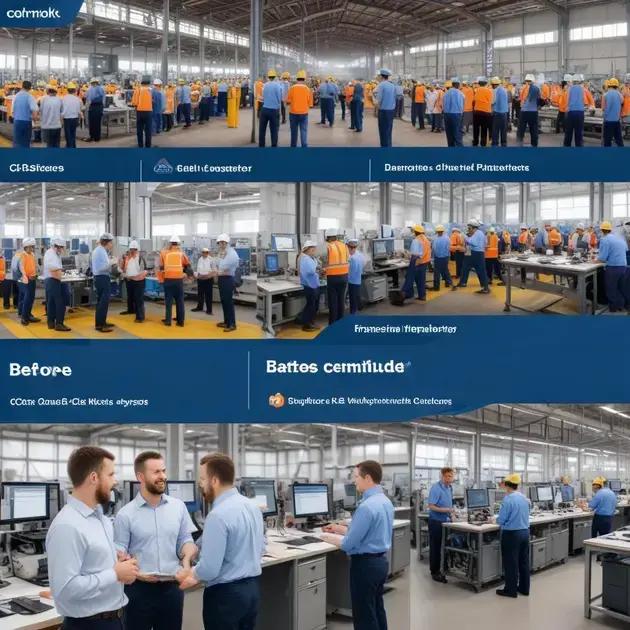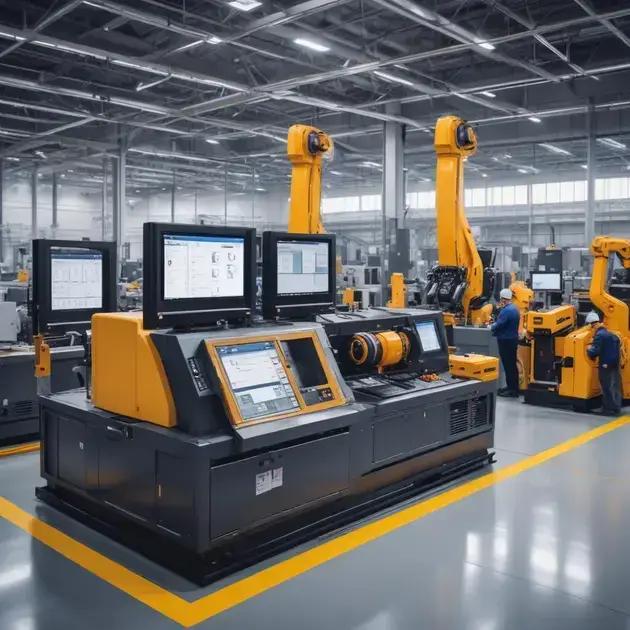Choosing the right CRM for your small business is crucial for enhancing customer relationships and streamlining operations. Assess your needs, explore options, utilize free trials, and ensure integration capabilities to find a system that supports your growth and efficiency.
CRM software for the manufacturing industry is becoming essential for businesses aiming to enhance productivity, improve customer relations, and drive growth. In a competitive landscape, having the right tools can make all the difference. This article delves into the significant benefits of CRM, how to select a suitable system, and notable success stories to guide manufacturers in their journey towards efficient operations.
Key Benefits of CRM Software for Manufacturing
Implementing CRM software for the manufacturing industry can transform how businesses operate. By enhancing customer relationships and making information accessible, CRM solutions empower manufacturing companies to focus on what matters most.
Improved Customer Relationships
One of the primary benefits of CRM software is the ability to manage customer interactions effectively. With a centralized database, companies can track customer histories, preferences, and feedback. This allows for personalized communication and improved customer satisfaction.
Increased Efficiency
CRM systems help streamline various processes, from sales management to order processing. By automating tasks such as data entry and follow-ups, manufacturers can reduce errors and free up employees to concentrate on high-value activities.
Sales Forecasting and Analytics
Another notable benefit is robust reporting and analytics capabilities. CRM software provides insights into customer behavior and sales patterns, enabling businesses to make informed decisions. This can improve inventory management and help forecast demand accurately.
Enhanced Collaboration
CRM platforms foster collaboration among teams by providing a single source of truth. Different departments can share insights and updates, which is vital in a manufacturing setting where communication is key to success. This leads to better problem-solving and innovation.
Customer Retention
Finally, by utilizing CRM tools, manufacturers can implement loyalty programs and follow-up with customers post-purchase. This proactive approach not only improves retention rates but also encourages repeat business, which is vital for long-term success.
How to Choose the Right CRM for Your Business

Choosing the right CRM for your small business is vital for improving customer interactions and boosting sales. With so many options available, it’s essential to know what to look for during your selection process.
Identify Your Business Needs
Start by assessing your business’s specific needs. Consider factors like your team size, the number of customers, and your primary objectives. Knowing your requirements will help you filter out CRM solutions that don’t meet your goals.
Ease of Use
A user-friendly interface is crucial in a CRM system. Your team should be able to navigate the software without extensive training. Look for platforms that offer free trials. This will allow your employees to test the software and gauge its usability before making a commitment.
Scalability
As your business grows, your CRM needs may change. Selecting a scalable CRM ensures that it can accommodate additional users and features over time. Choose software that allows you to upgrade as your business expands without significant disruptions.
Integration Capabilities
Ensure the CRM you choose can integrate with other tools your business already uses, such as email platforms, social media, and accounting software. This compatibility will streamline your operations and enhance productivity.
Customer Support
Reliable customer support is essential, especially during the initial setup. Check if the CRM provider offers support through multiple channels, such as phone, email, or live chat. Responsive support can minimize downtime and prevent frustration during the transition period.
Integrating CRM with Manufacturing Processes
Integrating CRM with manufacturing processes is essential for optimizing operations and enhancing customer relationships. A well-integrated system allows manufacturers to streamline workflows and improve communication.
Benefits of Integration
When CRM software is integrated with manufacturing systems, businesses can achieve greater efficiency. It enables real-time data sharing across departments, which helps to enhance order accuracy and reduce delays.
Data Synchronization
Data synchronization between CRM and manufacturing software prevents data silos. This ensures that teams have access to up-to-date information. For example, sales teams can view production schedules, allowing them to set realistic delivery expectations for clients.
Enhanced Customer Insights
Integrating CRM with manufacturing tools provides valuable insights into customer preferences and behaviors. This data can inform product development and marketing strategies, helping businesses respond better to market demands.
Streamlined Communication
With an integrated system, communication flow improves significantly. Sales, production, and customer service teams can collaborate more effectively, leading to faster problem resolution and better overall customer service.
Case Studies of Successful Integration
Many manufacturers have successfully integrated CRM systems with their processes to boost performance. For instance, some companies have reported increased sales by improving inventory management through CRM integration, leading to higher customer satisfaction due to timely deliveries.
Case Studies: Successful CRM Implementation in Manufacturing

Real-world examples of successful CRM implementation in manufacturing showcase how businesses can leverage these systems to enhance operations and customer relationships.
Case Study 1: ABC Manufacturing
ABC Manufacturing implemented a CRM system to streamline communication between their sales and production teams. By integrating their CRM with production software, they improved order accuracy. As a result, customer satisfaction increased by 30% within six months.
Case Study 2: XYZ Components
XYZ Components faced challenges with managing customer inquiries efficiently. They adopted a CRM that automated follow-ups and tracked customer interactions. This led to a 40% decrease in response times and 25% growth in repeat business as they could better meet customer needs.
Case Study 3: Precision Tools
Precision Tools experienced inventory management issues prior to adopting their CRM. The system helped them analyze sales data and forecast demand accurately. This adjustment resulted in a 15% reduction in holding costs and an overall increase in profitability.
Case Study 4: Global Fabrication
Global Fabrication utilized a CRM to enhance their customer support. By providing a centralized information repository, customer service representatives could access purchase histories and preferences quickly. The implementation led to a significant boost in customer retention rates by 20% over one year.
Case Study 5: Modern Electronics
Modern Electronics integrated their CRM with supply chain management to optimize their operations. This integration allowed them to track orders in real-time. They reported a 50% improvement in efficiency and a 30% increase in sales due to better alignment with customer demand.
Future Trends in CRM Software for Manufacturing
As technology advances, future trends in CRM software for manufacturing are set to reshape how businesses operate. Here are some key trends to watch for in the coming years.
1. AI and Automation
Artificial Intelligence (AI) is increasingly becoming integrated into CRM software. AI can help automate routine tasks such as data entry, lead scoring, and customer interactions. This automation allows teams to focus on more strategic initiatives and improve overall efficiency.
2. Enhanced Data Analytics
Data analytics capabilities are expected to grow in CRM solutions. Advanced analytics will enable manufacturers to gain deeper insights into customer behavior, production efficiency, and market trends. This will empower companies to make data-driven decisions that enhance their competitive edge.
3. Mobile Accessibility
As more employees work remotely or on the go, mobile accessibility will become a standard requirement for CRM systems. Manufacturers will seek software that allows easy mobile access to customer data and communication tools, ensuring productivity no matter where employees are located.
4. Cloud-Based Solutions
Cloud-based CRMs provide flexibility, scalability, and lower costs. In the manufacturing sector, this trend will continue as companies aim to reduce infrastructure costs and set up systems that can grow according to their needs.
5. Integration with IoT Devices
The integration of CRM software with Internet of Things (IoT) devices will enable manufacturers to track machinery and production processes in real-time. This will facilitate better customer communication regarding product availability and delivery timelines, enhancing overall customer experience.
6. Personalized Customer Engagement
Future CRM solutions will prioritize customer engagement through tailored marketing and communication strategies. By leveraging customer data and preferences, manufacturing companies can create personalized experiences that foster loyalty and satisfaction.
In Summary: Choosing the Right CRM for Your Business
Selecting the right CRM is essential for your business’s success. By assessing your specific needs, researching available options, and taking advantage of free trials, you can find a solution that fits well with your operations.
Consider integration capabilities and scalability to ensure the CRM grows with your business. Additionally, prioritize good customer support to simplify the transition and ongoing use.
By following these steps and understanding the features that matter most, you can enhance customer relationships, streamline operations, and set your business up for future success.
FAQ – Frequently Asked Questions About Choosing the Right CRM
What is the first step in choosing a CRM for my business?
The first step is to assess your specific business needs and identify the challenges you want the CRM to address.
Are there free CRM options available?
Yes, many CRM providers offer free versions that can be suitable for small businesses with basic customer management needs.
How do I know if a CRM can grow with my business?
Look for CRMs that offer scalable features and plan options. This allows you to add users and functionalities as your business expands.
What should I consider about integration when choosing a CRM?
Ensure that the CRM can seamlessly integrate with your existing software tools, such as email and accounting systems, to maintain your workflow efficiency.
Why is customer support important in a CRM?
Good customer support is essential for helping you resolve issues quickly during setup and throughout usage, ensuring that your CRM operates smoothly.
Can I try a CRM before committing to a purchase?
Many CRM providers offer free trials or demos, allowing you to test the software and see if it meets your needs before making a financial commitment.




